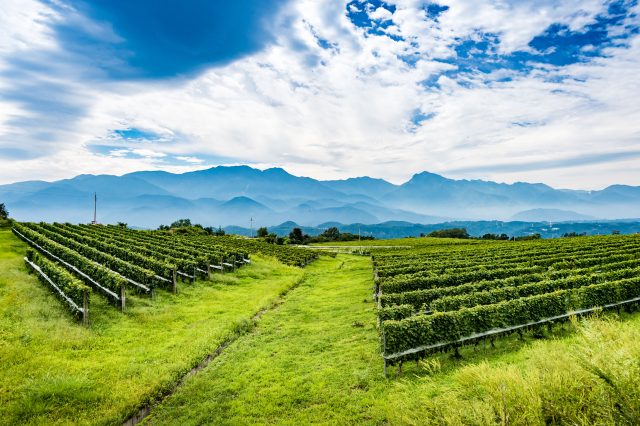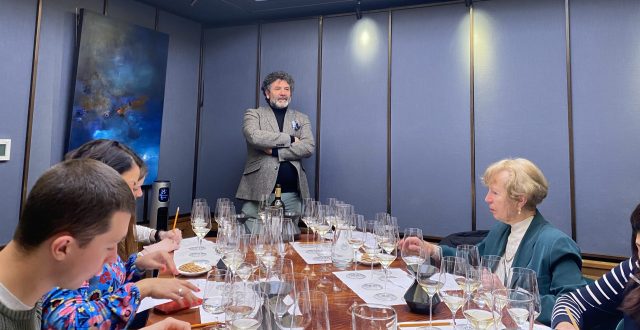This website uses cookies so that we can provide you with the best user experience possible. Cookie information is stored in your browser and performs functions such as recognising you when you return to our website and helping our team to understand which sections of the website you find most interesting and useful.
Barrier to entry: what is holding Japanese wine back?
Fractional quantities of Japanese wine make their way past the country’s border, so what is stopping them from gaining notoriety on a global scale?

Japanese farmers have been cultivating Koshu grapes for hundreds of years. Grown primarily in the Yamanashi Prefecture, even today the majority of Koshu production is for table grapes and other products.
The small percentage of berries that make their way into a bottle provide a lot of diversity despite the relatively small quantities. Master Sommelier Isa Bal hosted a Koshu of Japan masterclass at London’s 67 Pall Mall yesterday, with sparkling, oak- and lees-aged still and orange wines on show all produced from Koshu.
“When I think of Koshu as a wine, two words come to mind,” says the sommelier, who works at the newly-awarded two-Michelin-starred Trivet in south east London. The first is precision, “like anything Japanese”, he says. The second is elegance.
Both elegance and precision Bal ties to the winemaking itself. “The most important part of terroir is the hand,” he says, holding up a palm. Koshu, which he compares to Chardonnay, is not over aromatic, making it a blank canvas for different techniques. “It’s a grape variety you can do so much with,” he says.
Pergola systems are used for the majority of Koshu vineyards in Yamanashi, though more modern trellising techniques are also being used.
Sparkling wines are commonly made under traditional method, and the orange wines from Japanese Koshu producers are light, void of harsh tannins and exhibit the grape’s “elegance”.
Still, “wines are predominantly made with Japanese consumers in mind”, Bal says.

Japanese multinational Suntory owns three wineries in Japan. Its most historic, Tomi No Oka, exports only to China and Hong Kong. Exports make up less than 1% of production volumes, and the winery produces approximately 30,000 cases a year.
It’s a similar story for Japanese winery Château Mercian. Although it exports to the UK, Hong Kong, Singapore, the US, with Italy soon to be added to the list, just 1% of its 67,000 cases produced each year make it overseas.
Boutinot’s Dan Sharp, who imports Château Mercian to the UK, says interest is growing predominantly in the UK’s sommelier-led restaurants. He says he receives more enquiries about wines from Japan than any others, though demand is not growing as significantly as curiosity.
Lumière Winery — founded in 1885 by local lord T. Furiya — has made more progress overseas, but still exports less than 10% of its 250,000 bottles produced each year. Asian markets including Hong Kong, Taiwan, China, the Philippines and Vietnam are among its export markets, as well as the US, UK and Netherlands further afield.
Japanese wines are present in the UK only in extremely limited quantities, and price point is one of the major obstacles. Lumière works with Amathus in the UK, which imports just a couple of pallets a year. The wines retail from £20 a bottle, which can easily translate to £100 on-trade.
Still relatively unknown as a winemaking country, price can present a major “handicap” for Japanese wine, Bal says.
“Capitalism does not care how good you are at what you do. If the price isn’t right, people won’t buy it,” he adds. This is at odds with the economic situation in Japan, he argues, where “nothing is cheap to produce”.
“The workforce is extremely expensive, and if someone makes something really good, they don’t want to mark it down in price.”
Japanese wines therefore remain most popular in Japan, where they pair well with the cuisine.
Bal believes that the larger producers will pave the way for development on the global wine stage, with smaller producers following in their footsteps, making “something more individual” to excite experimental drinkers.
Related news
A 'challenging yet surprising' vintage for Centre-Loire in 2024

